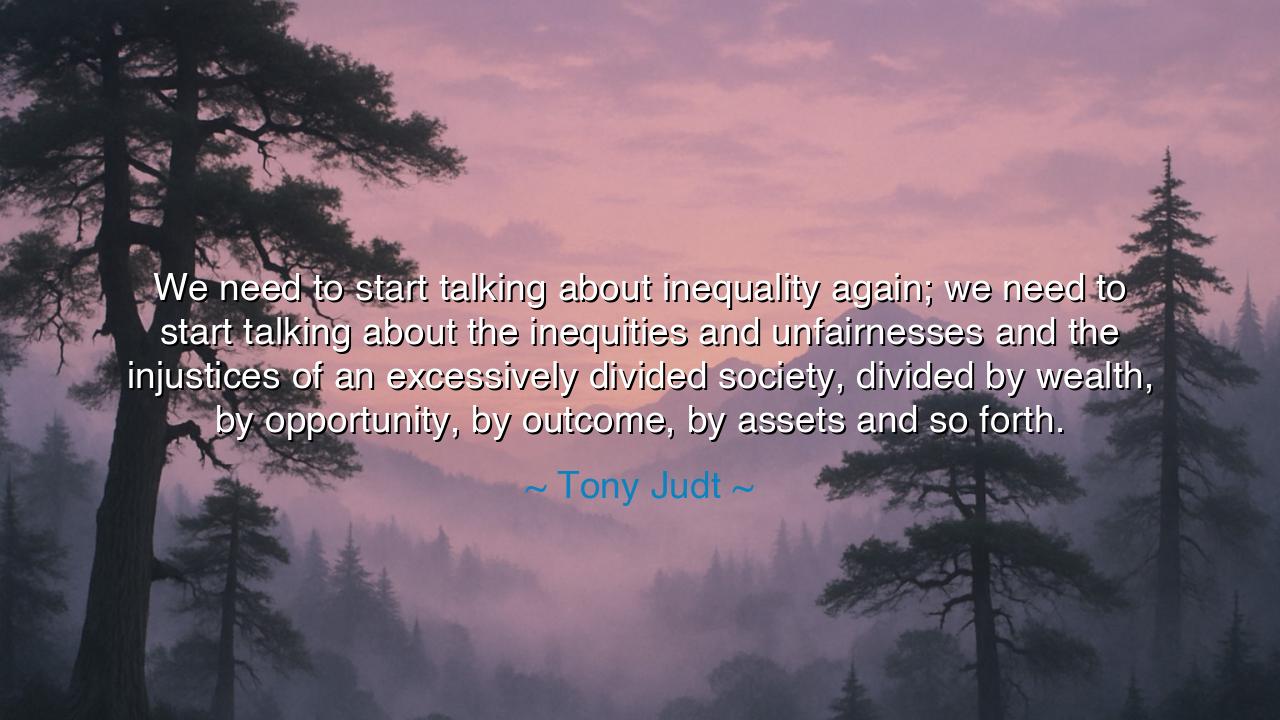
We need to start talking about inequality again; we need to start
We need to start talking about inequality again; we need to start talking about the inequities and unfairnesses and the injustices of an excessively divided society, divided by wealth, by opportunity, by outcome, by assets and so forth.






Hear the words of Tony Judt, historian and prophet of the modern age, who spoke with urgency: “We need to start talking about inequality again; we need to start talking about the inequities and unfairnesses and the injustices of an excessively divided society, divided by wealth, by opportunity, by outcome, by assets and so forth.” These words are not idle complaints, but the cry of one who saw the dangers of silence. For the greatest threat to liberty and peace is not only injustice itself, but the forgetting of it, the refusal to name it aloud.
Inequality has always stalked humanity, as old as the first kings who built palaces while peasants tilled the soil. Yet what Judt warns against is not simply its existence, but the complacency that follows prosperity—the tendency of society to grow accustomed to division until it feels natural. When wealth towers too high, when opportunity narrows to a trickle, when the fates of children are determined not by merit but by inheritance, then a people stand on the brink of fracture. And if they will not speak of it, they will not heal it.
History bears witness. Recall the fall of the Roman Republic, when vast estates swallowed small farms, and the common citizen was driven from the land into poverty. The voices of the Gracchi brothers rose to name the inequities, to demand reform, to restore balance. Yet they were struck down, and Rome chose silence over justice. The result was civil war, dictatorship, and eventually empire. Their story is a mirror of Judt’s warning: when inequality is unspoken, it festers into catastrophe.
And yet, there are also tales of renewal. In the nineteenth century, amid the grinding poverty of the industrial age, the workers of Europe raised their voices. They spoke of hours too long, wages too meager, lives too broken. Through unions, reforms, and laws, they reshaped nations. The rise of public education, the reduction of child labor, the protections for workers—these victories were not born of silence, but of speech, of naming the injustices until society itself could no longer ignore them.
Judt calls us, then, to courage. To speak of inequality is uncomfortable, for it confronts privilege and unsettles power. Yet it is necessary, for silence is complicity. The divisions of wealth, of opportunity, of outcome and assets, are not abstract—they are chains that bind the lives of millions. To name them is the first step to loosening them. The tongue that speaks justice is sharper than the sword, for it cuts away illusion and reveals the truth of things.
The lesson for us is clear: do not be lulled into forgetting. Do not let prosperity blind you to those who are excluded from it. Ask yourself, in your community, your nation, your world: Who is left behind? Who bears the weight while others reap the reward? Speak these questions aloud, for in their asking lies the seed of justice. The ancients said: the city is healthy not when the rulers flourish, but when even the weakest citizen finds dignity.
Therefore, take practical action: support leaders and teachers who speak honestly of inequality; refuse to be comforted by illusions of fairness when the truth shows otherwise; teach children not only ambition, but compassion; and in your own life, give voice to those who cannot be heard. For the greatness of a society is not measured by the towers of its rich, but by the dignity afforded to its poor.
Thus, remember Judt’s call: to talk about inequality is not mere speech, it is the defense of liberty itself. For silence breeds decay, but speech awakens conscience, and conscience awakens change. Let us speak, therefore, not with bitterness but with courage, not with despair but with hope, that the divided world may yet be mended, and justice may be written again into the heart of our civilization.






AAdministratorAdministrator
Welcome, honored guests. Please leave a comment, we will respond soon